When facing criminal charges, choosing the right legal representation is crucial. A competent criminal defense attorney can make the difference between acquittal and conviction. This guide will walk you through the essential steps and considerations when hiring a criminal defense attorney, ensuring you make an informed decision to safeguard your future.
Understanding the Role of a Criminal Defense Attorney
The primary role of a criminal defense attorney is to protect the rights of their clients. They are tasked with building a defense strategy tailored to the specific charges their client faces. From managing pre-trial processes to representing clients in court, a criminal defense attorney ensures that the accused receives a fair trial. Effective attorneys dedicate time to understanding the nuances of each case, while also providing consultation and support. By hiring an expert in criminal law, you can navigate the complexities of the justice system with greater confidence.
An adept criminal defense attorney possesses a deep understanding of the law and a sharp ability to interpret and apply it. They keep abreast of the latest legal trends, reformations, and precedent-setting court rulings. Their knowledge allows them to craft meticulous defense strategies that can withstand scrutiny. This expertise is not just beneficial; it is essential for uncovering procedural mistakes or rights violations that could tilt the case in your favor. Thus, hiring a well-informed attorney is a step towards ensuring a robust defense strategy.
Another critical aspect of a criminal defense attorney’s role is negotiation. Often, cases are resolved before reaching the courtroom through skilled negotiation with prosecutors, leading to reduced charges or lighter sentences. This aspect requires the attorney to possess adept interpersonal skills and a strong understanding of the criminal justice system’s working dynamics. Negotiation can provide a quicker and less stressful resolution compared to a courtroom battle. Therefore, having an attorney skilled in negotiation is crucial for achieving favorable outcomes whenever possible.
Qualities to Look for in a Criminal Defense Attorney
When hiring a criminal defense attorney, one of the top qualities to seek is experience. Experience in defending clients against charges similar to yours is invaluable. It ensures that the attorney is familiar with potential challenges and effective strategies for achieving the best results. Beyond general experience, some attorneys specialize in particular areas of criminal defense, which can be advantageous. Therefore, ask questions about the attorney’s history of dealing with cases like yours to evaluate their suitability.
Another vital quality is communication skills. A good criminal defense attorney should be an effective communicator both in and out of the courtroom. This includes the ability to explain complex legal terminology in simple terms so clients can make informed decisions. Furthermore, a communicative attorney will keep you updated on the progress of your case, ensuring transparency and understanding throughout the process. Trust and clarity are built on effective communication, making it a critical asset in legal representation.
Reputation is also a significant consideration when selecting a criminal defense attorney. An attorney’s reputation, whether it pertains to their ethical standards or success rates, can provide insight into their professional conduct and reliability. Seeking recommendations and performing due diligence by checking online reviews or endorsements can paint an accurate picture of an attorney’s standing. Lawyers with strong reputations often have established relationships within the legal realm, proving beneficial in negotiating deals or navigating the court system. Thus, assessing an attorney’s reputation is a vital step in your decision-making process.
The Hiring Process and Important Considerations
Recognizing that the hiring process can be overwhelming, begin by conducting comprehensive research. Compile a list of potential criminal defense attorneys and scrutinize their credentials, background, and client reviews. Knowing their specialties and success rates will provide clarity on their capability to handle your case effectively. Always consider reaching out for consultations, as these interactions will give a firsthand sense of their professionalism and approach. The hiring process is about finding someone you can trust; ensure that your decision is guided by objective research and personal comfort.
During initial consultations with prospective attorneys, prepare questions to gauge their approach and expertise. Ask about their strategy for handling cases should they be hired, and explore any potential challenges they foresee. Inquire about fee structures and additional costs that might arise, as financial transparency from the onset is crucial. The consultation phase is an opportunity not only to evaluate their knowledge but also to ensure your expectations align. Taking the time to engage in thorough discussions can prevent misunderstandings and form a solid foundation for a lawyer-client relationship.
Consider logistical factors such as location, availability, and workload when selecting a criminal defense attorney. It’s vital to choose someone readily accessible to discuss developments and updates on your case. A local attorney might also offer insights into local courts, judges, and procedures. Ensure that the attorney you select is not overburdened with cases; adequate attention to your case is imperative. Balancing these aspects with qualifications is critical to making a well-rounded choice for legal representation.

